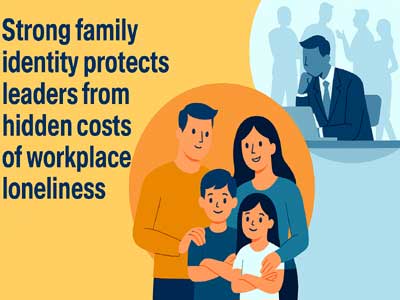Leaders with strong family networks are less likely to let feelings of loneliness at work spill over into their home lives, finds new research from Durham University Business School.
Having close family connections gives leaders a sense of belonging and emotional support. The researchers say these ties act like a safety net, helping them deal with stressful work situations.
The research, conducted by Durham University Professors Karolina Nieberle, Janey Zheng, Olga Epitropaki, and Keming Yang, alongside Prof Michelle Hammond from Oakland University, comprised two separate studies.
They first surveyed over 170 managers at multiple times per day, resulting in data from more than 1,000 workdays, with a total of over 4,000 data points. The second study interviewed 185 managers about their past experiences of loneliness at work and how they responded to it.
These investigations revealed that on days when leaders felt lonelier than usual, they were more likely to withdraw from tasks and reduce engagement with their employees. Even short-term periods of loneliness, such as feeling a little lonesome on the morning of a workday-reduced leadership engagement, including both task and relationship withdrawal from employees.
Outside of work, this led leaders to distance themselves from family, creating a self-reinforcing cycle of loneliness, with the potential of further damaging relationships at home and in the office.
However, leaders with strong family ties were found to be less likely to let work-related loneliness spill over into home life, demonstrating the protective effect of family identity on mitigating the impact of loneliness.
The study, says Dr Nieberle, offers important insights into the wider consequences of short-term loneliness for leadership development. “These findings highlight a hidden barrier to effective leadership,” says Dr Nieberle, and Dr Zheng adds that “Loneliness is often overlooked, but it can quietly undermine both work and home life. Leaders who cultivate strong family connections are better able to stay engaged and resilient on those days when they feel lonesome.”
The research also provides a number of practical steps leaders and organisations can take to prevent and tackle loneliness at work. “Leaders should actively nurture relationships outside work to create a buffer against workplace stress, while organisations can support this through introducing or retaining family-friendly policies, flexible working arrangements, and investing in peer-support networks that allow leaders to share their experiences and coping strategies”, says Prof Epitropaki.
By recognising and addressing loneliness in leadership roles, organisations can not only act to protect the personal well-being of their staff, but also enhance team performance, engagement, and retention, as a result, the researchers state.














Related Items
Positive work relationships boost proactive behaviour at work
Young Indians are earning new identities through work and skill
Agra University struggles to restore its fading reputation